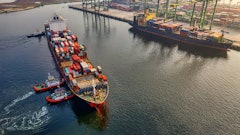
In an industry where the only constant is change, uncertainty is so prevalent that it has become a certainty. Thus, when successful growth depends on strong logistics and transportation management, the ability to confront disruption rapidly and confidently is necessary. That means developing operational procedures that adapt to changes, no matter the situation.
Macro-level events quickly trickle down and impact all aspects of supply chains. Sometimes things get better, sometimes worse, and other times, they are just different. In supply chains and beyond, there are only two certainties: that change will be constant and that winners will take on the challenge of uncertainty instead of running from it.
Impact on brokers and 3PLs
While brokers and third-party logistics (3PL) providers may never be sure where goods will go, there is one sure thing: they will have to move. And when they do, most will go by truck. However, securing space and pricing capacity is subject to constant fluctuation. Sometimes there is a capacity shortage, and it becomes a carrier’s market, while other times, excess capacity forces a pricing race to the bottom. Not knowing when the pendulum will swing or how far can be disconcerting – for some, even paralyzing.
The truth is that growth is possible in any market if the companies are set up to take advantage of the opportunities. The market may dictate the direction of capacity, price, and mode selection, but each business controls its ability to act on current economic realities. That is not to say that every broker and 3PL should try to be all things to all customers, only that their growth depends on having the flexibility to apply their expertise without being held back.
So, what does that mean? It means that growth-stage truckload brokers may want to expand into LTL. Large, sophisticated brokerages might wish to stabilize transaction-based revenue with service-based revenue. 3PLs might see in-house brokerages as a way to source their capacity and provide the service to others. Expansion is always a growth path, but in this industry, it is key to maintaining the flexibility to thrive in uncertain conditions.
Impact on shippers
Nobody is more directly affected by various economic uncertainties than the manufacturers, distributors and retailers who need goods in people’s hands and need trucks to get them there. Some companies outsource their entire logistics operations, while others prefer to maintain complete control to engineer the best possible outcomes.
The same uncertainties around capacity, price, and mode impact shippers, too, whether managed in-house or not. For self-managing companies, it is essential to spot market trends before competitors do, so they can pivot, secure capacity, lower costs or explore new modes ahead of the majority.
Shippers need the ability to make decisions just like logistics service providers- the agility to shift between parcel and LTL, using contracted rates, turning to the spot market for full truckloads, moving the trucks out quickly, or optimizing the cubic footage of each trailer. The ability to act swiftly and follow through on those actions will define success for more than just the logistics function of the business.
Impact of technology
Whichever side of the shipping equation one is on, the question is whether a business will survive uncertainty or thrive amidst it. Will success depend on whether the company can return to a position of advantage, or will it be the result of making its own luck? Technology plays a significant role in the answer. Nothing is worse than seeing change unfold in front of you, having the skills and experience to know exactly what needs to be done, but not immediately having the system capabilities to execute.
The right technology, particularly the right transportation management or shipping software, is how any transportation-dependent business accesses its various options, makes decisions and executes. Uncertainties will spring up in many places, affecting some more than others, but the important thing is that customers have the tools and support to emerge stronger.



















